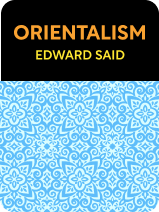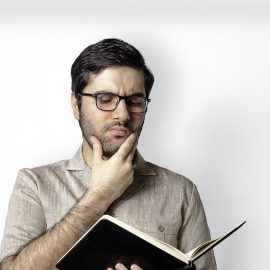

This article is an excerpt from the Shortform book guide to "Orientalism" by Edward Said. Shortform has the world's best summaries and analyses of books you should be reading.
Like this article? Sign up for a free trial here .
What is the problem with the Orientalist discourse? How did the Orientalist scholars influence the common perceptions of East Asian societies?
According to Edward Said, Orientalist discourse never attempted to inform people or challenge their preexisting “knowledge” of the Orient. Rather, its purpose was to confirm and reinforce it.
Keep reading to learn about Orientalist discourse.
Forging the Orientalist Discourse
Ancient Greek city-states like Athens and Sparta explicitly defined themselves by their contrasts with and opposition to the despotic “Asiatic” Persian Empire. The Greek city-states may have been bitter rivals, but they were united in their shared identity of not being of the “barbarian” Orient.
This tradition of Greek “othering” of the Orient goes all the way back to the very earliest works of Western literature. In The Iliad, the foundational text of Western literature, Homer presents the antagonistic kingdom of Troy as a stand-in for the Orient—a decadent and dangerous foe to be vanquished by the daring and heroic Greeks.
Later, the ancient Greek tragedies of Aeschylus (c. 525-c. 455 BCE), Sophocles (c. 497-c. 406 BCE), and Euripides (c. 480-c. 406 BCE) presented the Orient in a similar way. In Aeschylus’s The Persians, the Persian emperor Xerxes is presented as the ultimate figure of mourning, loss, and defeat, lamenting the crushing of his forces by the Greeks at the Battle of Salamis (480 BCE). This is the earliest known representation of the supine, submissive East kneeling before the dominant and superior West. For the intended Greek audience, the message is clear—Asian challenges to the Greeks will result only in Asia’s own ruin and lamentation.
In a tradition that would later be picked up by the European Orientalists, these works never present the perspective of the Orient on its own terms. Always, the words and feelings of the Orient are filtered —by Greek writers, for the benefit of Greek audiences. The Orient does not, and cannot, speak for itself.
Later Western encounters with the Orient—from the journeys of the ancient Greek historian Herodotus (c. 484-c. 425 BCE), to the conquests of Alexander the Great (356-323 BCE), to the Crusades during the Middle Ages, to the journeys of Marco Polo (1254-1324 CE)—only reinforced these themes of strangeness and otherness.
The very separateness of the Orient was a key element in forging the Orientalist discourse.
Islam and Orientalism
The rise of Islam in the Arabian peninsula in the 7th century and its stunning conquest of vast swathes of Asia, Africa, and Europe brought a new dimension to the Orientalist discourse.
For the Christian West, Islam became the great existential menace, threatening the frontiers of Europe while occupying the Christian sites of the Levant. For the next millennium, until the fall of the Ottoman Empire after World War One, Islam would occupy a singular role in the European mind, standing as the only plausible threat to European Christian hegemony.
This was reflected in the European Orientalist discourse. In representing and describing the alien entity of Islam, Western writers imposed their own archetypes on it. Even the name they ascribed to Islam, “Mohammedism,” betrays this attitude. They saw Islam as a bastardization or perversion of the true religion of Christianity, with the prophet Mohammed as the fraudulent Muslim analogue to Christ. As Christ was to Christianity, so was Mohammed to Mohammedanism—a gross misunderstanding of Islam, which celebrates Mohammed as a prophet but does not worship him as God.
The Orientalists inherited this dismissal of Islam. Even with their great monotheistic religion, the “Oriental” mind was only capable of producing an inferior facsimile of the Western original.
The Dawn of Orientalism
In the early 19th century witnessed an explosion of interest in the study and acquisition of ancient Egyptian, Persian, and Assyrian texts within learned European circles, comparable to the rediscovery of ancient Greek and Roman works that marked the Renaissance in Italy during the 14th and 15th centuries.
Leading Orientalist figures like the German Julius von Moh (1800-1876), president of the Société Asiatique, produced lengthy encyclopedic compendia of all things Oriental, encompassing art, literature, religious texts, and architecture.
But for all of their admiration for the ancient civilizations of the Middle East and their unquestionably brilliant scholarship, this first generation of Orientalists could not help but perpetuate and codify the same ancient myths about the Orient that we’ve seen had existed in the European consciousness since antiquity.
The purpose of Orientalist discouse and scholarship was never to inform readers or challenge their preexisting “knowledge” of the Orient—it was to confirm and reinforce it.
The Problem With the Orientalist Discourse
The Orientalists’ singular focus on ancient texts made this all but inevitable—because of their commitment to the idea of an essential, unchanging Orient, they came to believe that rigorous study of the ancient Egyptian Book of the Dead and the Pyramid Texts could provide a scholar with penetrating insight into the society, culture, and politics of modern Middle Eastern societies.
Orientalism’s textual approach contributed to the dehumanizing tone and attitudes that pervaded much of Orientalist discourse, treating human beings—indeed, even enormously complex human societies—as reducible to what texts had to say about them. For the Orientalist, the story of the East was fundamentally one of texts, not people.
The modern Orient, meanwhile, held little value for the Orientalist scholar, because of their belief that the essential character of the people and their societies had remained the same since ancient times. As such, there was no need to engage with the actual people of the Orient or to even attempt to understand their daily lived experiences.
Thus, their methodology had real-world consequences, as Orientalists sought to apply ancient texts to address the problems of the modern Orient, fully consistent with their belief in an unchanging East—and in their unique role as its interpreters.
This textual approach tended to create a feedback loop in how Westerners described and ultimately acted upon the East:
- Orientalists’ experiences in the actual Orient were inevitably shaped by the books and ancient manuscripts they’d read about it.
- This, in turn, influenced how they interacted with the Orient when they arrived there, interpreting their own experiences through their Orientalist lens.
- Those text-influenced experiences, lastly, determined how the Orient would be written about for the next generation of Western scholars and administrators.
Thus, Orientalism was not some musty, ivory-tower academic discipline. It shaped real-world interactions and remade the region and culture it purported to describe through the vehicle of European imperialism. European imperialists and travelers acted upon and wrote about the actual Orient through an explicitly Orientalist lens. In doing so, they defined and categorized their experiences into well-worn Orientalist tropes, forcing reality to bend to their preconceived ideas and even changing how the people of the Orient viewed themselves—in effect, Orientalizing the Orient.

———End of Preview———
Like what you just read? Read the rest of the world's best book summary and analysis of Edward Said's "Orientalism" at Shortform .
Here's what you'll find in our full Orientalism summary :
- How Western society invented the concept of Orientalism
- Why "the Orient" was thought of as a different, exotic, and dangerous place
- How Orientalism was central to European colonialism






